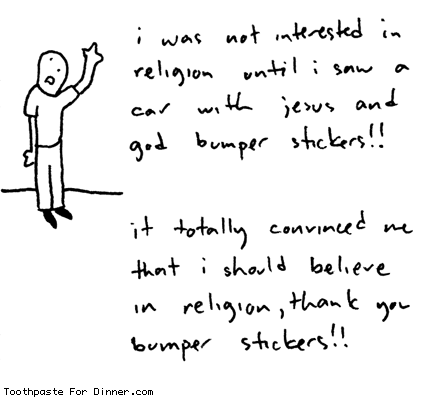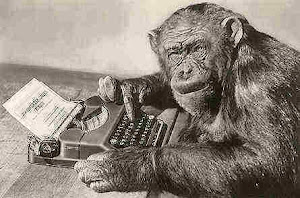It started with, what else, a car. My car to be exact. I was in it and I was driving it. I was driving it on the freeway on my way home from work. I was in traffic so the other cars were all unusually close. Like, five or six feet apart. You can’t leave too much room or you’ll have to give way to the perpetual lane changer than like to roam the streets between the hours of rush and rush.
I was no less than five feet from a red Jeep Cherokee listening to the news, so I wasn’t really paying much attention to my comrade’s rear end. But my eyes glanced across its bumper and my mind read, “Blah, blah, Jesus, blah, blah.”
Insert double take here.
“Jesus,” I exclaimed. “I know that guy.” So, I had to read what the sticker said.
It was at this realization that I was reminded by the perpetual lane changer merging in front of me that I had left too much space between me and the bumper sticker. I’d lost it. Well, almost lost it. I flipped on my left blinker, which is basically useless since the rear blinker light is burned out, dropped into fourth gear, and jammed on the gas to make a pass. A high speed pursuit was under way.
The pass was unsuccessful; remember this was during rush hour. The Jeep was able to get two car lengths up and made a move into the left lane. I was behind. I jumped back over to the right, hoping to ride some of the luck the Jeep had, but nothing. Both lanes were doing the same speed and I was still two lengths down. Then the Jeep made a move for the car pool lane. How could it? There was just the driver, no passenger; as far as I knew. I made a jump back to the left and contemplated breaking the law along with the Jeep. There were no cops along this stretch and I had a straight shot to gain the lost ground I needed on the Jeep to read the bumper sticker and get out of the HOV lane as soon as possible.
I opted not to break the law; too many potential 864-HERO (correction: it's actually 764-HERO) callers out there for my comfort. So, I looked to find a way through the congestion to catch this Jeep before my upcoming exit. I darted back to the right lane and again to the right where there was a bit of space and I hit the gas. I came around a corner and I saw nothing but tail lights. A state patrol officer had someone pulled over on the right shoulder and it was holding back the general flow. Then a semi truck came up on my left and I lost sight of the Jeep. Man! Twelve seconds in the HOV lane and I would have had it, but no. Honest Clayton had to opt toward the law and was stuck in traffic ticket traffic. My exit approached and I left with my head held low.
Now, all this started with a mere glimpse of the name “Jesus.” Something was said about Him and I had to know what it was. Imagine if you will that this was always our reaction when we encounter Jesus. His name, His work, His love, whatever it was that we encountered, we instantly went into a pursuit of Jesus.
Wait, shouldn’t it always be like that? Isn’t Jesus supposed to be so irresistible, so necessary, that when we encounter Him we cannot help but drop everything and follow Him? Uh, yeah. Well, it isn’t is it? Why not? What’s getting in the way?
Is it an HOV lane? We have an opportunity to find out more about Jesus, but the risk is too much. If I do that, I’ll get into trouble. Well, wouldn’t Jesus be worth getting into a little trouble? It seemed that way for people who lost there lives following Him.
The point I’m getting to is there are people who literally risked everything to pursue Jesus; they we completely willing to take on a high speed pursuit for truth. And yet there are those who are afraid they’ll have to take a financial hit if they follow Jesus, they’ll have to take a hit in social status if they follow Jesus, they’ll lose street cred, or whatever.

One of my favorite movie scenes is a scene in Bullitt where Steve McQueen’s character, Frank Bullitt, is chasing after alleged killers of a witness that was in his care. Not only is this the original car chase scene (Like, all the other ones after have copied this one), and not only does it feature a pair or really sweet-ass cars (the new mustang is based off of the one Frank Bullitt drives) that sound amazing on film, but it also demonstrates how far Bullitt was willing to pursue and discover truth. I feel if we aren’t willing to get into a high speed chase for Jesus, we shouldn’t call ourselves His followers.
“But the gateway to life is very narrow and the road is difficult, and only a few ever find it.”
-Matthew 7:14




